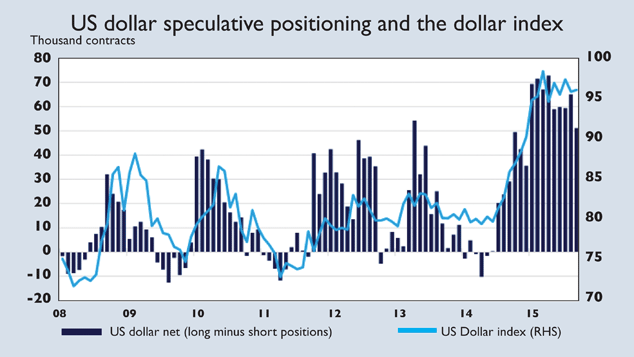The Fed is 'dread-locked' – any rate rise will be an only child
The fear of making a disastrous policy mistake is keeping the Federal Reserve from raising interest rates, says Dr Peter Warburton.
Get the latest financial news, insights and expert analysis from our award-winning MoneyWeek team, to help you understand what really matters when it comes to your finances.
You are now subscribed
Your newsletter sign-up was successful
Want to add more newsletters?

Twice daily
MoneyWeek
Get the latest financial news, insights and expert analysis from our award-winning MoneyWeek team, to help you understand what really matters when it comes to your finances.

Four times a week
Look After My Bills
Sign up to our free money-saving newsletter, filled with the latest news and expert advice to help you find the best tips and deals for managing your bills. Start saving today!

There are two good reasons to expect the US dollar to strengthen further. The first is that the US economy might awaken from its slumbers and churn out another impressive burst of growth. In that case, members of the US Federal Reserve's interest-rate setting committee would appear as bumbling Keystone Cops, way behind the game. The front part of the US yield curve would steepen to reflect a faster pace of tightening than that currently priced in, boosting the positive carry into US dollars out of euros and yen (in other words, traders could earn higher interest payments by swapping their euros and yen for dollars, driving the dollar higher).
The second good reason would be if market confidence, already frayed after a bruising August, was shattered by news of a big bank in trouble perhaps one with strong Chinese connections or a full-blown emerging economy crisis. In this case, the US dollar would seem compelling as rumours of so-called 'dollar shortages' spread like wildfire.
It might never happen
Yes, the Japanese economy is in the midst of one of its agonising pauses, but the prime minister, Shinzo Abe, and the central bank chief, Haruhiko Kuroda, show no sign of being panicked into further money printing. And as far as it is possible to know, China is selling US government bonds at an unprecedented pace as a logical extension of its net capital outflow. The absence of a fresh motive to accumulate US dollar positions is sufficient basis for a reversal of fortunes.
MoneyWeek
Subscribe to MoneyWeek today and get your first six magazine issues absolutely FREE

Sign up to Money Morning
Don't miss the latest investment and personal finances news, market analysis, plus money-saving tips with our free twice-daily newsletter
Don't miss the latest investment and personal finances news, market analysis, plus money-saving tips with our free twice-daily newsletter
The 20% surge in the dollar's value since last summer, not least against the Chinese yuan, the Brazilian real and the Indian rupee, is making life increasingly uncomfortable for global corporations headquartered in the US. Over 30% of US net profits are generated in emerging-market currencies, so a strong dollar amounts to a wealth transfer to the rest of the world. A rebound in US growth in the April-June quarter seems not to have followed through into this one.
The Atlanta Fed estimates a measly 1.5% growth pace based on data posted to date. The failure of the oil price to sustain its summer rally has triggered further cancellations and postponements of US energy-related capital spending.
We're still waiting for lift-off
Will China's economic dislocation put paid to the 2015 rate rise? There is also a smarty-pants scenario in which Fed chair Janet Yellen raises the funds rate and the interest on excess reserves, but by a miserly ten or 15 basis points, rather than the regulation 25 (0.25%). Either way, this rate rise is likely to be an only child.
Does this sound like a confident march towards the normalisation of rates after more than six years in the wilderness? Hardly. The market's expectations for future US interest rates today are a pale shadow of those that helped propel huge inflows towards the dollar last year.
Who'll be next in the White House?
So here are the questions: how well will foreign capital be treated under a Clinton administration? What will be the attitude of her administration towards the financial sector in general? Her proposed changes to capital gains tax would raise the rate to 43% for investments held for less than two years. Will the US descend into protectionism? Will the Fed's wings be clipped? Will relations with China turn sour? Will there be a rethink on welfare? Will there be a reappraisalof the unconventional energy sector?And given these questions will investors still prefer the US dollar?
Dr Peter Warburton is director of Economic Perspectives Ltd.
Get the latest financial news, insights and expert analysis from our award-winning MoneyWeek team, to help you understand what really matters when it comes to your finances.
Dr Peter Warburton is director of Economic Perspectives Ltd.
-
 Can mining stocks deliver golden gains?
Can mining stocks deliver golden gains?With gold and silver prices having outperformed the stock markets last year, mining stocks can be an effective, if volatile, means of gaining exposure
-
 8 ways the ‘sandwich generation’ can protect wealth
8 ways the ‘sandwich generation’ can protect wealthPeople squeezed between caring for ageing parents and adult children or younger grandchildren – known as the ‘sandwich generation’ – are at risk of neglecting their own financial planning. Here’s how to protect yourself and your loved ones’ wealth.